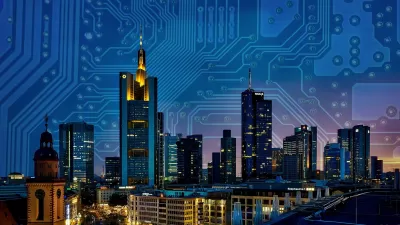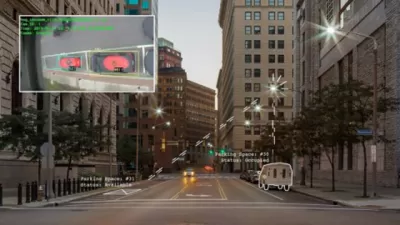In the quest to improve efficiency and effectiveness, "smart" technologies are helping cities become more intelligent machines. But a growing chorus fears the side effects of increased privatization, surveillance, and technological sophistication.
"The smart city has become a buzzword in urban planning and university engineering departments, and a topic of breathless coverage in science and business magazines," says Courtney Humphries. "Although today the vision exists more in the realm of promise than reality, cities such as Boston have begun to invest time and chunks of their budget to laying the groundwork."
"But as political leaders, engineers, and environmentalists join the smart-city bandwagon, a growing chorus of thinkers from social sciences, architecture, urban planning, and design are starting to sound a note of caution. Building a new, intelligent urban infrastructure could be every bit as momentous as building a water supply, or roads, or a subway system—setting development patterns for decades. Though they share enthusiasm for what a smart city could do, they also point out that smart-city programs could—with little public oversight—put us on track to a kind of urban future that not everyone thinks is ideal."
What's at stake may be the soul of the city itself: the Platonic ideal of the "the orderly, manageable city" versus the "chaotic and dynamic whirl of activity."
FULL STORY: The too-smart city

Study: Maui’s Plan to Convert Vacation Rentals to Long-Term Housing Could Cause Nearly $1 Billion Economic Loss
The plan would reduce visitor accommodation by 25,% resulting in 1,900 jobs lost.

North Texas Transit Leaders Tout Benefits of TOD for Growing Region
At a summit focused on transit-oriented development, policymakers discussed how North Texas’ expanded light rail system can serve as a tool for economic growth.

Using Old Oil and Gas Wells for Green Energy Storage
Penn State researchers have found that repurposing abandoned oil and gas wells for geothermal-assisted compressed-air energy storage can boost efficiency, reduce environmental risks, and support clean energy and job transitions.

San Mateo Formally Opposes Freeway Project
The city council will send a letter to Caltrans urging the agency to reconsider a plan to expand the 101 through the city of San Mateo.

A Bronx Community Fights to Have its Voice Heard
After organizing and giving input for decades, the community around the Kingsbridge Armory might actually see it redeveloped — and they want to continue to have a say in how it goes.

Houston Mayor Promises Dedicated Austin Street Bike Lane After Public Backlash
Although the one-way bike lane won’t be protected by physical barriers, the proposal is an improvement over the mayor’s initial plan to only include sharrows on the Austin Street project.
Urban Design for Planners 1: Software Tools
This six-course series explores essential urban design concepts using open source software and equips planners with the tools they need to participate fully in the urban design process.
Planning for Universal Design
Learn the tools for implementing Universal Design in planning regulations.
Borough of Carlisle
Caltrans
Heyer Gruel & Associates PA
Institute for Housing and Urban Development Studies (IHS)
City of Grandview
Harvard GSD Executive Education
Toledo-Lucas County Plan Commissions
Salt Lake City
NYU Wagner Graduate School of Public Service




























